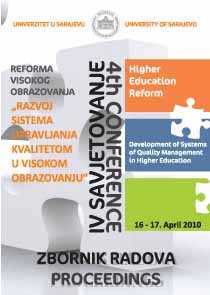Primjena Bolonjskog procesa i osiguranje kvaliteta u području humanističkih nauka
Implementation of the Bologna Process and Ensuring Quality in the Field of Humanistic Sciences
Author(s): Jasna BajraktarevićSubject(s): Social Sciences
Published by: Univerzitet u Sarajevu
Keywords: Bologna process; market of knowledge; intellectual and mental status of students; primary selection
Summary/Abstract: The unification of European countries also implies the readiness of educational systems to unify at the state level in order to become a part of the system covered by the Bologna process. The decade behind us was exactly marked with more or less successful attempts to improve the system of higher education. This was primarily done for the benefit of students and teachers with the sole aim of ensuring efficient and high-quality staff recognizable at the increasingly ruthless and inaccessible market of knowledge, all along bearing in mind the fact that knowledge is least valued in transition countries. In such a limited race with time, being overly intent on ECTS and the system of credits, with the first and second cycle of examinations, a growing number of students bringing financial gain to higher education institutions, we have overlooked, forgot, or, it is perhaps easier to admit, we have minimized the significance of the basic factor which ensures professional, qualified, expert and scientific staff - the factor of primary selection of students, which is the condicio sine qua none in the field of humanistic sciences. These students, regardless of whether they study under the Bologna process or not, will after obtaining their diplomas work exclusively with people; they will shape their identities, form their personal integrity and create a system of value which will serve as the intellectual heritage for future generations. The fact problematized in this paper is present at most private and public faculties in Bosnia and Herzegovina, which during the enrolment process only formally consider the intellectual, education and especially the health potential of future academic citizens. We are witnesses that even students with pronounced psycho-pathological symptoms and modest potential are able to come to terms with curricula, and it is inappropriate (and impossible) to stigmatize them in any way, even though we as teachers are aware of the fact that their insufficient capacities (intellectual, social and mental) may be disastrous for the future generations they will be working with. Quality in the field of humanistic sciences needs to be ensured through primary selection and only then should we focus on the quality of the education system itself.
Journal: Zbornik radova - Univerzitet u Sarajevu
- Issue Year: 2010
- Issue No: 04
- Page Range: 267-270
- Page Count: 4
- Language: Bosnian

